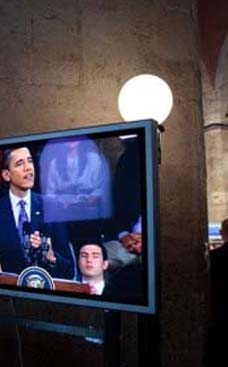
"Peru under Alejandro Toledo was a success story. But the tales of the rural migrants in the slums that ring Lima speak volumes: the model, for them, did not work. Convinced, therefore, that his job was only half-done, Toledo announced that he would leave Stanford to return to his native country. This time, his goal was to eradicate poverty, and make the difference in the lives of poor Peruvians that his previous term of office failed to do. It's a tough choice. Lima has some of the world's finest restaurants, but I'm not sure how many of us would trade the comforts of a tenured professorship at one of the world's richest universities for the hard edges of a big, ramshackle, violently unpredictable city like Peru's capital. But decisions like these aren't based on formulae. They come from the heart. Toledo's appears to lie back in his homeland." Alejandro Toledo grew up in Chimbote and was befriended by Peace Corps Volunteers who helped him study in the United States. Later he was a language instructor in Brockport's Peace Corps/College Degree Program. Elected President of Peru in 2000, Toledo invited the Peace Corps to return to Peru after a 27 year absence. He is presently a visiting Fellow at Stanford University.
John Rapley writes: Peru's macroeconomic indicators performed very well during Toledo's term of office yet the gains of growth did not spread widely among Peruvians, and the poor wondered what was in it for them
The limits of growth
Published: Thursday | May 21, 2009
Through the plate-glass windows behind the podium, you could see the deep-blue sky and tall trees of northern California. For those who have only heard, it really is true that the climate here is perfect: lots of sunshine, warm without being too hot.
So my mind wandered easily when the former president of Peru took the podium at a small dinner put on for him at Stanford University. Alejandro Toledo is a small man, and he barely emerged above the podium. But he was among friends at his alma mater and current employer: when introduced to the small gathering of economists, he was described as Peru's best-ever president.
Many Peruvians would beg to differ, though. And because he lived in Lima during his presidency, rather than the salubrious setting of Palo Alto; and because he himself comes from a large, poor family, and hears the voices of his people, he knew this.
Asked to speak of what would lift Latin America out of poverty, Toledo was posed questions about labour market rigidities and regional integration. But he surprised his audience when he ignored those themes. When asked if there were one thing he could have done differently during his presidency, he replied that it would have been to focus more of his attention on social programmes.
Anyone who has visited a Lima slum knows why. Peru's macroeconomic indicators performed very well during Toledo's term of office. Growth averaged around six per cent per year, and inflation all but disappeared. In the textbook of economic reform, Peru merits a gold star.
Unpopular man
Yet, Toledo left office an unpopular man, having largely retreated to his presidential palace, behind a security cordon. The gains of growth did not spread widely among Peruvians, and the poor wondered what was in it for them. This drew into question the sustainability of the Peruvian model. Without political support, reform risked undermining itself. Populism began rearing its head, as it has in other Latin American countries.
Latin American politicians know this in their bones. Toledo scorned the rise of authoritarian populism, and reserved special disdain for his Venezuelan colleague, Hugo Chávez. But he also understood, better than his academic colleagues seemed to, that Latin American growth could not depend upon macroeconomic reform alone. "I believe in markets," he said. "But I am not a fanatic."
Econometric methods
The distinguished panel of experts to which he spoke would probably never have considered themselves fanatics. But he had, perhaps, exposed a weakness in the dominance of econometric methods and macro-economic models in policymaking over the last generation.
For the gap between the numbers, and experience, appears wide at times. The figures in the regression analyses make it clear: Peru under Alejandro Toledo was a success story. But the tales of the rural migrants in the slums that ring Lima speak volumes: the model, for them, did not work.
Convinced, therefore, that his job was only half-done, Toledo announced that he would leave Stanford to return to his native country. This time, his goal was to eradicate poverty, and make the difference in the lives of poor Peruvians that his previous term of office failed to do.
It's a tough choice. Lima has some of the world's finest restaurants, but I'm not sure how many of us would trade the comforts of a tenured professorship at one of the world's richest universities for the hard edges of a big, ramshackle, violently unpredictable city like Peru's capital.
But decisions like these aren't based on formulae. They come from the heart. Toledo's appears to lie back in his homeland.
John Rapley is president of the Caribbean Policy Research Institute (CaPRI), an independent think tank affiliated to the UWI, Mona. Feedback may be sent to columns@gleanerjm.com.











